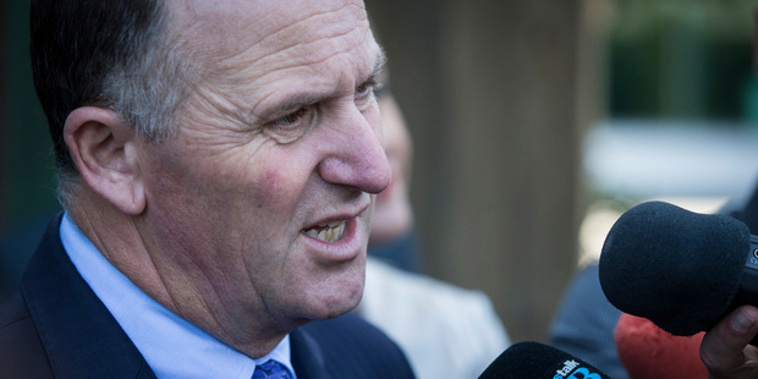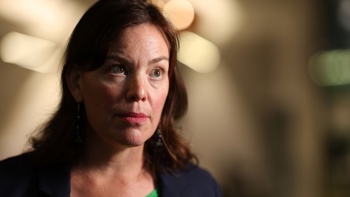
UPDATED 6.33PM: $1 billion is being made available to aid local councils in solving the housing crisis, Prime Minister John Key has announced.
Key announced the move as part of his keynote address at the National Party's annual conference in Christchurch, which is also celebrating the party's 80th birthday.
The money is available to councils in the areas feeling the biggest housing pinch including Auckland, Christchurch, Hamilton, and Queenstown.
The funds are tagged for the roads and water infrastructure that makes the construction of housing possible - considered the key areas that are holding back development.
There is a catch, however. The government is borrowing the money, and the council will have to pay it back, meaning debt will rise for all parties.
Key admits the scheme amounts to a subsidy from the entire country to those five cities considered to have a housing crisis.
"If by doing this we take some pressure out of housing inflation, that means that the Reserve Bank has left pressure on it in terms of interest rates and it helps New Zealanders right across the country," he said.
Key signalled the government was considering another big measure: Urban Development Authorities for specific areas of high housing need.
They would have the power to override barriers to large-scale development which could include responsibility for planning and consenting.
A number of options were being considered for the management of the fund including a similar model to Crown Fibre Holding which was created to manage the roll-out of Ultra-Fast Broadband.
Labour leader Andrew Little said the “$1 billion credit line” would do little to address the homeless crisis.
“When you have an infrastructure deficit in Auckland alone of nearly $20 billion and billions more around the country, a $1 billion loan? It simply doesn’t cut it.
“Just another credit line, when this Government has spent the last eight years criticising councils for the amount of debt they’ve got, that’s not the answer.”
Little said new models of financing infrastructure needed to be found.
“Our approach is to assist councils with that, and allow them to issue bonds, have targeted rates to repay them. That’s about putting the cost to where it should properly fall. But just more debt for councils - it’s not the answer to the problem we’ve got at the moment.”
Labour would in the coming week make three housing announcements, that would include more detail on its solution for funding infrastructure, he said.
It would also cover UDAs. Asked if Labour favoured such authorities, Little declined to give details ahead of the announcement.
However, the Green Party, which as an memorandum of understanding with Labour, views UDAs as a good idea, depending on how they are structured.
“We would need to see the detail...if they are focussed on good, green, urban design with affordable houses, then we are all for them,” Green Party co-leader James Shaw said.
The Canterbury Earthquake Recovery Authority (Cera) had shown the Government’s previous approach to urban development was “very authoritarian and top-down”, Shaw said.
“If they take a more democratic approach and actually engage with communities and councils in the design of cities, then I think they [urban development authorities] are a good idea.
Shaw said the infrastructure fund was a step in the right direction, but not enough and a commitment to invest in houses was needed.
“It puts councils in a difficult position because it is a loan. I think the idea of making it a loan rather than a true investment fund is so that Bill English can keep his books tidy.”
Auckland Mayor Len Brown welcomed both the infrastructure fund and future establishment of urban development agencies, and looked forward to reviewing the initiatives in detail.
“While we are yet to see the details, these initiatives could contribute to the acceleration of housing supply in Auckland without increasing the burden on ratepayers or adding to council’s debt levels," he said in a statement.
Labour MP and mayoral candidate Phil Goff said the infrastructure fund was much less than needed, but welcome.
“It is an acknowledgement of the degree of crisis that cities, in particular Auckland, are facing with rapid population growth and severe constraints on their financial ability to provide the infrastructure to meet the needs of that growth.
“Now that we have established the principle…we can start to negotiate over the quantum, so that it is a meaningful sum.”
However, ACT Party leader David Seymour is highly critical of scheme, arguing it was designed to invent positive headlines, "but it will not actually affect the housing market at all because councils still have to pay the money back...their plan leaves councils with the same problem, just a different lender."
Earlier in the day, Housing Minister Nick Smith took questions from Party members, and blamed land prices for bloating of the Auckland housing market.
He said the price of a section in Auckland has gone up 350 percent over the last 25 years, far outweighing living costs.
Social Housing Minister Paula Bennett said that, while "it's not popular everywhere", more apartments and denser housing is the direction in which Auckland should move as it would create better communities.
Around twenty protesters are making their voices heard outside the Air Force Museum, showing their disapproval of the Trans-Pacific Partnership deal.
Take your Radio, Podcasts and Music with you









